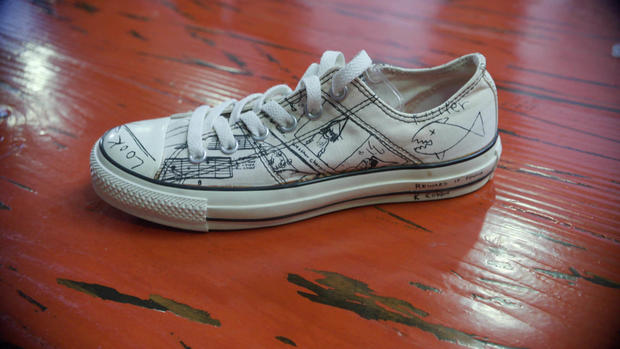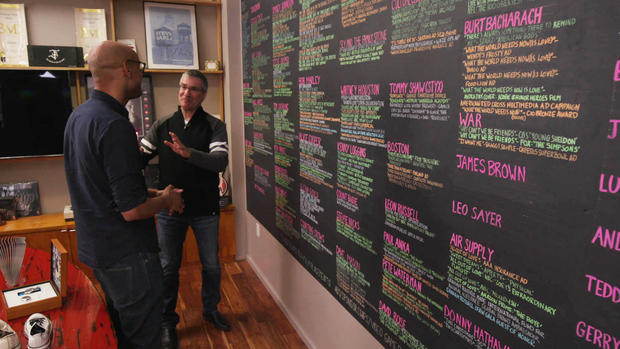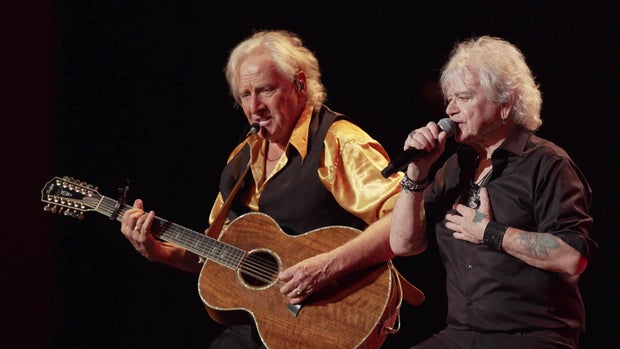Traditionally, in the audio field, functions like Air Source ended up only as good as their up coming strike. But for people today like Air Supply’s Graham Russell and Russell Hitchcock, moments are changing. In 2020, Bob Dylan sold his entire catalog to Universal Songs for a noted $300 million. Bruce Springsteen marketed to Sony Songs a yr afterwards for about $550 million.
Larry Mestel’s enterprise, Principal Wave, has been purchasing tunes catalogs because 2006. “Can you envision Sony without having Bruce Springsteen as section of their roster?” he instructed correspondent Kelefa Sanneh. “They have been gonna have to spend whichever they experienced to fork out to maintain Bruce Springsteen.”
Two several years back, Air Source bought a part of their songs legal rights to Key Wave. The company locations hits like “All Out of Enjoy” in Tv set demonstrates (like “Younger Sheldon”), and in commercials, these as this advertisement for AAA Coverage:
Sanneh stated to Hitchcock and Russell, “This is partly about celebrating and fulfilling you for the songs that you have produced.”
“While just before, if you signed a seven-album offer, they have been promising to take all your cash for seven albums!” laughed Russell.
Requested if he could don’t forget the initially deal he at any time signed, Hitchcock laughed, “Yeah, I consider it was a blank piece of paper with our signatures at the bottom!”
“And can you give men and women a sense of, like, how large a deal [Primary Wave] was?” Questioned Sanneh.
“It was massive,” Hitchcock replied.
“Large? We’re chatting, what, seven figures?”
“Larger than seven.”
Hitchcock and Russell also retain veto energy above in which the tracks are placed, in portion due to the fact of a undesirable working experience with soda, an audio business for Dr. Pepper they did in the 1980s. “It was awful!” Russell laughed.
Mestel has purchased rights of artists ranging from Smokey Robinson to Kurt Cobain. He held as an case in point a Converse sneaker bearing the creating of Cobain. Sanneh requested, “This sneaker played an significant purpose in the development of your company, suitable?”
“It did,” Mestel replied. “We were being the first firm essentially to put lyrics on the aspect of sneakers, and to flip the deal from a merch deal into a audio offer, correct? Mainly because the lyrics had to be accredited.”
CBS News
In 1985 Michael Jackson outbid his previous close friend Paul McCartney for the publishing rights to The Beatles’ catalog. It went for $47.5 million, but it was truly worth a whole lot far more. And some folks took absent a easy lesson: Under no circumstances offer your tunes.
Sanneh requested Mestel, “How did you battle that stigma?”
“Well, currently, it is uncomplicated, appropriate? For the reason that if a Bruce Springsteen is gonna market or a Sting is gonna offer and a Paul Simon is gonna market and a Bob Dylan is gonna market, you know, that kind of opens up the floodgates for artists in normal,” he replied.
Mestel’s enterprise now faces deep-pocketed opponents like Hipgnosis Songs Fund and Round Hill Music. The marketplace for music is maturing – and so are the singers. Mestel explained, “They’re in their 70s and 80s. So, artists are intrigued in estate preparing.”
“Are there specified genres that you happen to be interested in, or not as fascinated in?”
“Yeah, basic rock, city, we do jazz, we do soul,” Mestel reported. “We you should not generally do a lotta state audio. You do not see a ton of country tunes in commercials.”
CBS Information
Air Supply’s like songs are no for a longer period on the pop charts, but Russell Hitchcock and Graham Russell say the prospects are limitless.
“A long time and several years and many years in the past they truly had a System One particular car sponsored by Durex,” Hitchcock stated. “I went, ‘What? Condoms, you know, sponsoring an F1 car or truck?'”
“Has there ever been a condom advertisement working with an Air Supply track?” asked Sanneh.
“Hey, I am all in excess of that,” Russell laughed, singing, “You’re all out of love! I’m so dropped with out you …”
CBS Information
For extra info:
Story produced by Mary Raffalli. Editor: Emanuele Secci.


